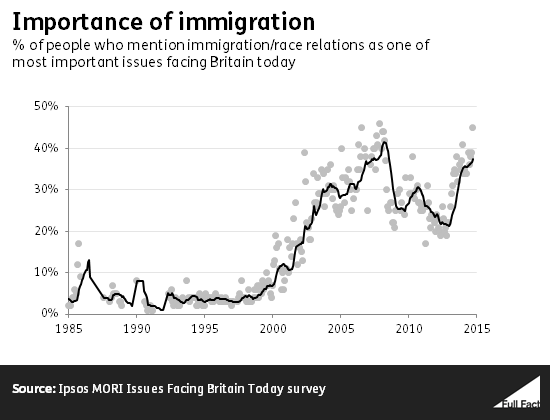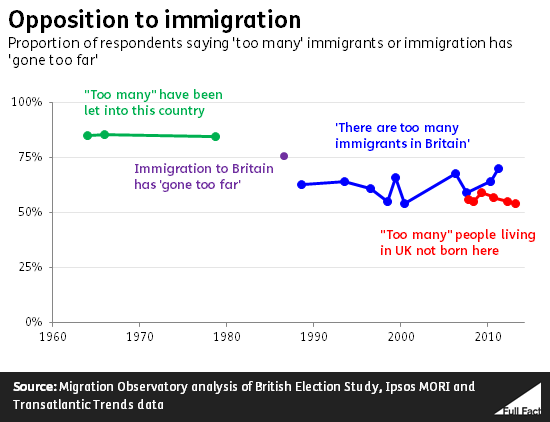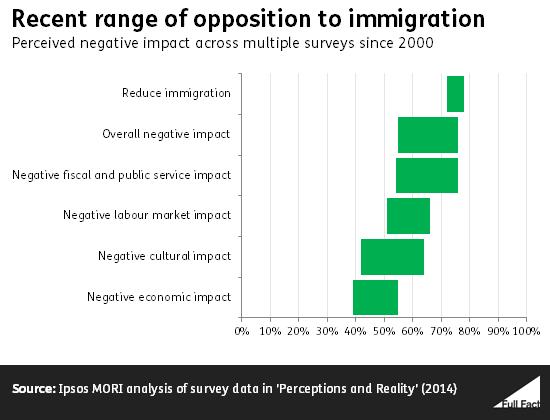Public attitudes towards immigration
- A quarter of people in Britain say that immigration is the single most important issue facing the country today, more than any other single issue
- About three quarters of people say immigration should be reduced and a majority have opposed immigration for over half a century
- People define 'immigrants' very differently, and their views vary depending on the group of immigrants concerned
- Student and high-skilled immigration has more support than low-skilled immigration and immigration for asylum purposes
- Most people are wrong about the scale of immigration, and the reasons people claim to come here for
Immigration is seen as the biggest issue
About a quarter of people say immigration is the most important issue facing Britain today and 4 in 10 say immigration is one of the most important issues—more than any other single issue.
Back in the 1980s and 1990s people were more concerned with issues such as health, education and unemployment but the importance of immigration ballooned in the early 2000s.
Join 72,953 people who trust us to check the facts
Sign up to get weekly updates on politics, immigration, health and more.
Subscribe to weekly email newsletters from Full Fact for updates on politics, immigration, health and more. Our fact checks are free to read but not to produce, so you will also get occasional emails about fundraising and other ways you can help. You can unsubscribe at any time. For more information about how we use your data see our Privacy Policy.
At a similar time, the number of immigrants coming to the UK started to heavily outstrip the number of people emigrating.
People don't think of 'immigration' in the same way, and are wrong about many aspects of it
Finding out what people think of immigration is actually quite awkward because they have different groups in mind when asked about the issue. There are official definitions of who counts as a migrant, but these don't match who people think of as immigrants.
People tend to see immigrants as citizens of other countries, rather than people born abroad. But official figures can include either.
A majority (62%) of people also think immigrants come here permanently, even though almost half of immigrants say they intend to stay less than two years. Of those who do emigrate, almost half say they were here for under four years.
Many also think the main reason people come to the UK is to seek asylum—more than work, family or study reasons. The reality is the exact opposite: asylum is the least common reason for immigration. Most immigrants say they're coming to study or work.
Most people are opposed to immigration in general
70% of people said they want to reduce or stop immigration completely according to a recent YouGov poll. And last year 77% wanted some sort of reduction according to the British Social Attitudes Survey.
That said, people are less opposed if they're asked simply whether or not there are too many immigrants, rather than being asked what should be done with them. A majority of people in Britain have expressed opposition to the number of immigrants in general since at least the 1960s, although it's difficult to determine whether there's a historical trend one way or the other because the wording of questions has changed.
Immigration is also viewed more negatively in Britain than in most other western countries.
Older people, manual workers and people with fewer qualifications most opposed
Age, occupation, education and household income make the biggest difference to someone's likelihood to be opposed to immigration, but men and women are fairly equally against, according to the British Social Attitudes Survey.
Most concern is about public services and jobs, less about economy as a whole or cultural impact
People are generally negative about immigrants' impact on the country's public services and jobs, but less so about the cultural impact.
Since 2006, people have cited the abuse of or burden on public services as one of the main causes for concern. More recently, pressure on jobs and employment has also been a leading factor. By contrast, community tension, lack of integration and crime or anti-social behaviour problems have ranked among the least important factors.
When it comes to the impact of immigration on the economy in general, people are fairly evenly split on whether it is a good thing or bad thing. Between 39% and 55% of people have said immigration has a negative impact on the economy in recent years.
Students and professionals seen more favourably than asylum seekers and low-skilled workers
People are more favourable about certain types of immigration than about others. Students, highly-skilled workers and professionals score well when people in the UK are asked what they think of them. Only a third of people want to limit the numbers of these groups.
On the other hand, extended family members (as opposed to more immediate family), asylum seekers and low skilled workers are more opposed. The same study found between 55-65% of people want reduced immigration of these groups.
Most people also say 'professional' immigrants are 'good for Britain' and that unskilled labourers are bad for it.
People also respond more negatively to migrants from "muslim countries like Pakistan" than "migrants from Eastern Europe".
Opposition is greater in areas with less immigration—except areas with the most asylum seekers
People in areas with the most history and biggest influx of immigrants, such as London, are the least likely to call for reduced immigration, although most people still favour cutting immigration in those areas.
That said, opposition to immigration is highest in areas like Bolton, Rotherham and Swansea—which have large populations of asylum seekers— and so buck the general trend. They're classified as 'asylum dispersal areas' which have high worklessness and social housing levels.
National problem, not local problem
Since the mid-noughties about three quarters of people have said immigration is a problem in Britain. But when asked if it's a problem in their local area, only about a quarter of people say so.
That's a "massive gap", according to Ipsos MORI, but not entirely unique to immigration as a policy issue.
About two thirds of us, for instance, think crime is going up nationally. But only a third say it's gone up locally. Not as big a difference as on immigration, but the gap is still there.
People also tend to think of their 'local area' differently. Often this will be confined to the street someone lives on, rather than the local town or region — so it's not necessarily painting a meaningful picture.
More information
- Ipsos MORI's wide-ranging analysis Perceptions and Reality covers most of the issues discussed here in depth
- The University of Oxford's Migration Observatory has briefing sheets on overall attitudes to immigration and levels of concern and what determines these attitudes
- Migration Watch UK lists results of recent opinion polls, with sources
If you've seen further analyses we should be including, please get in touch: feedback@fullfact.org


